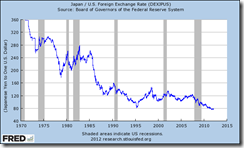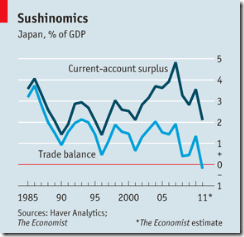The conduct of ‘imperialist’ US foreign policies somewhat resembles US monetary policies: mercantilism channeled through currency wars.
Writes Professor Steve Hanke at the Financial Post, (bold emphasis mine)
The United States has a long history of waging currency wars in Asia. We all know the sad case of Japan. The U.S. claimed that unfair Japanese trading practices were behind the ballooning U.S. bilateral trade deficit.
To correct the so-called problem, the U.S. demanded that Japan adopt an ever-appreciating yen policy. The Japanese complied and the yen appreciated against the greenback, from 360 in 1971 to 80 in 1995 (and 77, today). But this didn’t close the U.S. trade deficit with Japan. Indeed, Japan’s contribution to the U.S. trade deficit reached almost 60% in 1991. And, if that wasn’t enough, the yen’s appreciation pushed Japan’s economy into a deflationary quagmire.
Today, the U.S. is playing the same blame game with China. And why not? After all, China’s contribution to the U.S. trade deficit has surged to 45%.
Above is the USDollar Japan Yen chart since 1970 (St. Louis Federal Reserve)
Yet in spite of the massive appreciation partly from US behests, Japan’s trade balance remained positive until last year (for the first time in 31 years; chart from the Economist)
Well, Professor Hanke points out that a currency war with China has had a precedent.
To appreciate just how dangerous currency wars can be, let’s lift a page from the U.S. government’s old currency war playbook. During his first term, President Franklin D. Roosevelt delivered on his Chinese currency stabilization “plan.” China’s yuan was pegged to the price of silver, and it was asserted that higher silver prices would benefit the Chinese by increasing their purchasing power. Congress granted the Roosevelt Administration the authority to buy silver in massive quantities. The administration pushed the price of silver up by 128% in the period between 1932 and 1935. As the dollar value of silver went up, so did the value of the yuan.
America’s “plan” worked like a charm, but it had consequences that Washington had not quite advertised. The rapid appreciation of the yuan threw China into the jaws of the Great Depression. Between 1932 and 1934, its gross domestic product fell by 26% and wholesale prices in the capital city, Nanjing, fell by 20%. China officially abandoned the silver standard on Nov. 3, 1935. This spelled the beginning of the end for Chiang Kai-shek’s Nationalist government.
Every political policy has designated winners and losers, which means that monetary policies too have political dimensions. And perhaps anytime the US government sees a serious contender to their economic tiara, their political-bureaucratic stewards intuitively resort to what seems as bullying or intimidation or “beggar thy neighbour” policies: currency war. [Brazil in 2010 raised the spectre of an escalation of a currency war or competitive devaluation.]
Yet such political stratagem of scapegoatism seems contrived to divert the attention of the average Americans from the policy mistakes committed by the US government (boom bust cycles, fast expanding welfare state, war on terror policies and etc…).
We can even fuse together monetary and US foreign policies—the EU’s recent sanction on Iran seems parceled into the US Federal Reserve’s bailout.
Also, the US has even been selling China as a military threat to advance US military’s exposure in Asia, simultaneously while the Obama administration has been criticizing China’s trade and currency policies. All these seem to be part of the psywar operative.
Never mind if the US seems on path towards internal policy induced decadence.
For what seems intended is the preservation of the status quo, or the entitlements of the entrenched patrons—the political class and their clients—the banking and military industrial complex—all at the expense of everyone else.
The philosophy of mercantilism or protectionism, once wrote Ludwig von Mises,is indeed a philosophy of war.


No comments:
Post a Comment